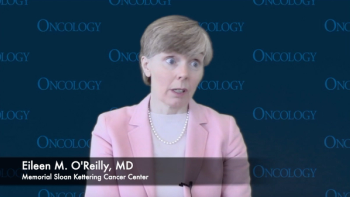
Experts in gastrointestinal cancer focus on frontline therapy options for patients with pancreatic cancer.

Your AI-Trained Oncology Knowledge Connection!


Experts in gastrointestinal cancer focus on frontline therapy options for patients with pancreatic cancer.

The medical oncologist from Memorial Sloan Kettering Cancer Center discussed challenges in treating patients with pancreatic center, and also the challenge of obtaining effective drugs in the clinical setting.

In this interview, we discuss the current state of pancreatic cancer management, and look toward trials to further define the best course of treatment for this deadly disease.

All improvements in outcomes for patients with metastatic pancreatic adenocarcinoma have occurred with the use of cytotoxic agents, which will probably remain the mainstay of treatment for advanced pancreatic adenocarcinoma.

The case of recurrent pancreatic cancer presented in this issue of ONCOLOGY by Dr. Dasari and colleagues illustrates the significant challenges faced by both medical and surgical oncologists in the management of pancreatic adenocarcinoma. This case describes an all-too-common clinical scenario: A thorough preoperative assessment indicating resectable disease, but with the initial medical oncology assessment revealing overt metastatic disease. The development of distant metastases in the short interval between pre-operative and post-operative staging reflects the aggressive underlying biology associated with a subset of patients with this malignancy. New insight into the genetic evolution of pancreas adenocarcinoma from Yachida and colleagues suggests that the latent period between initial development of pancreas adenocarcinoma and development of metastases is measured in years, however detection of the diagnosis at an early stage remains an ongoing challenge for clinicians.[1]

Pancreatic cancer is a leading cause of cancer-related mortality. Treatment has limited efficacy, and 5-year survival rates remain less than 5%. Insights from epidemiology and discoveries in molecular genetics have laid

Cancers of the gallbladder and biliary tract are uncommon malignancies in the United States with a combined incidence of less than 8,000 new cases per year, about 5,000 of which are gallbladder cancer and about 2,000 to 3,000 of which are cholangiocarcinomas, including intrahepatic, hilar, and distal bile duct cancers.[1] For gallbladder cancer with mucosa-confined disease, the 5-year survival rate is approximately 32%, and for advanced disease, less than 10% of patients survive longer than 1 year.[2]

This article will review the pertinent data on the use of chemotherapy for all stages of pancreatic cancer. For patients with metastatic disease, fluorouracil (5-FU) was the standard of care for several decades until a single

Irinotecan (CPT-11, Camptosar) a topoisomerase I inhibitor derived from the Chinese shrub Camptotheca acuminata, has broad activity in varied gastrointestinal malignancies, including pancreatic, biliary, esophageal

Irinotecan (Camptosar), an active agent in the treatment of fluorouracil-refractory colorectal cancer, has antitumor activity in upper gastrointestinal cancers. Clinical trials from Japan indicate antitumor responses in gastric and

Published: October 1st 2001 | Updated:

Published: July 1st 2002 | Updated:

Published: January 15th 2014 | Updated:

Published: March 2nd 2001 | Updated:

Published: August 1st 1998 | Updated:

Published: December 15th 2010 | Updated: